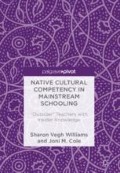Abstract
This chapter identifies pervasive areas of cultural disconnect between the two communities that contribute to an unwelcoming school environment for Native students and an attendant opportunity gap between Native and non-Native students. These include the failure to acknowledge tribal sovereignty, a deficit orientation toward Native culture, and a lack of sensitivity to Native values and communication styles. The examination of these disconnects forms the structure of the chapter as follows: failure to recognize Mohawk sovereignty, free trade versus “smuggling,” deficit orientation to the Mohawk community, notions of family and community, orientations to time, individual versus community identity, matriarchal culture, and differing speech norms.
Access this chapter
Tax calculation will be finalised at checkout
Purchases are for personal use only
References
Alfred, G. R. (1995). Heeding the voices of our Ancestors: Kahnawake Mohawk politics and the rise of native nationalism. Toronto, Canada/New York: Oxford University Press.
Brayboy, B. M. (2005). Toward a tribal critical race theory in education. The Urban Review, 37(5), 425–446.
Cleary, L. M., & Peacock, T. D. (1998). Collected wisdom: American Indian education. Boston: Allyn & Bacon.
Johansen, B. E., & Mann, B. A. (2000). Encyclopedia of the Haudenosaunee (Iroquois Confederacy). Westport, CT: Greenwood Press.
Klug, B. J., & Whitfield, P. T. (2003). Widening the circle: Culturally relevant pedagogy for American Indian children. New York: RoutledgeFalmer.
Ladson-Billings, G. (1995). Toward a theory of culturally relevant pedagogy. American Educational Research Journal, 32, 465–491.
Lee, C. D. (2001). Is October Brown Chinese? A cultural modeling activity system for underachieving students. American Educational Research Journal, 38(1), 97–141.
Pewewardy, C. (2002a). American Indian and white students talking about ethnic identity in teacher education programs: Helping teacher education students know themselves as cultural beings. Action in Teacher Education, 24(2), 22–33.
Pewewardy, C. (2002b). Learning styles of American Indian/Alaska Native students: A review of the literature and implications for practice. Journal of American Indian Education, 41(3), 22–56.
Reyhner, J., & Jacobs, D. T. (2002). Preparing teachers of American Indian and Alaska Native students. Action in Teacher Education, 24(2), 85–93.
Reyhner, J., Lee, H., & Gabbard, D. (1993). A specialized knowledge base for teaching American Indian and Alaska Native students. Tribal College: The Journal of American Indian Higher Education, 4(4), 26–32.
Author information
Authors and Affiliations
Rights and permissions
Copyright information
© 2018 The Author(s)
About this chapter
Cite this chapter
Williams, S.V., Cole, J.M. (2018). Cultural Disconnect. In: Native Cultural Competency in Mainstream Schooling. Palgrave Macmillan, Cham. https://doi.org/10.1007/978-3-319-67795-8_3
Download citation
DOI: https://doi.org/10.1007/978-3-319-67795-8_3
Published:
Publisher Name: Palgrave Macmillan, Cham
Print ISBN: 978-3-319-67794-1
Online ISBN: 978-3-319-67795-8
eBook Packages: EducationEducation (R0)

